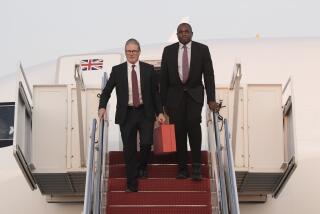After Rocky Start in Relations, Bush to Meet Putin
- Share via
MOSCOW — It took a bumpy five months to arrange, with U.S.-Russian relations going through more than a few ups and downs along the way, but President Vladimir V. Putin is finally getting his wish for a face-to-face meeting with President Bush.
In advance of the meeting Saturday in Slovenia, Russian officials have been laying out modest expectations, portraying the summit as a chance for the two presidents to take measure of each other, hear each other out and try to establish some rapport.
For Russia, the most important aspect of the two-hour tete-a-tete in Ljubljana, the Slovenian capital, may be that the meeting is taking place at all. It shows that while today’s Russia may not pack the geopolitical punch that the Soviet Union did in the postwar epoch, it is still a power that needs to be treated with respect.
For more than a year, Putin has signaled his wish for a more active dialogue with U.S. officials but has gotten only ambiguous replies, noted Sergei M. Rogov, director of the prestigious USA-Canada Institute in Moscow.
“We heard many times that the door is open for Russia,” Rogov said. “But that door was painted on a brick wall.”
But now things may be looking up, he suggested.
“If George W. Bush is really ready to open the door for Russia and invites Russia, step by step, to join the community of democratic and developed countries, I don’t believe Putin could say no,” he said. “This is an offer we can’t refuse.”
When Bush took office in January, it was amid hints that the new Republican administration wanted a tougher, more arm’s-length approach toward Russia, one shorn of 1990s illusions that the two former Cold War enemies had become good friends.
Defense Secretary Donald H. Rumsfeld’s labeling of Russia as a “proliferator,” plus the diplomatic expulsions that followed the arrest of FBI agent and accused Moscow spy Robert Philip Hanssen, got the Bush administration off to a frosty start as far as the Russians were concerned.
Also troubling to the Kremlin was Bush’s decision to make his missile defense initiative the centerpiece of a revamped national security policy. His proposal implied abandoning or overhauling the 1972 Antiballistic Missile Treaty, which has been the cornerstone of arms control for decades.
The stage seemed set for an era of tension between Washington and Moscow. “In the last 10 years in the history of Russian-U.S. relations, this spring was the lowest point,” said Liliya F. Shevtsova, an analyst with the Carnegie Moscow Center think tank.
But somehow, both sides got their relations back on course. The catalyst may have been the April 1 collision of a U.S. surveillance plane with a Chinese fighter jet over the South China Sea and the diplomatic maneuverings of the Bush administration to recover the American crew and plane after the aircraft made an emergency landing in China.
The incident focused U.S. attention on China as a strategic rival and was followed by a mellower public tone toward Russia.
When Bush formally announced his missile shield plan May 1 in a speech at the National Defense University in Washington, it was preceded by a cordial telephone call to Putin. According to the official Russian account of the conversation, Bush promised to consult with Moscow and not take one-sided steps. Instead of rejecting Bush’s proposal out of hand, Russian officials reciprocated by saying they looked forward to consultations.
A Kremlin official close to Putin, briefing reporters this week on condition of anonymity, said that during the past few months, relations “were put to a serious test. But mutual self-restraint averted a confrontation.”
From Russia’s perspective, he said, the summit in Ljubljana is not about hiding disagreements but achieving “constructive, stable and predictable relations with Washington.”
“It is necessary to create mechanisms for ongoing cooperation,” the official said.
To analyst Shevtsova, it is obvious that the Bush team would have been content to let the two leaders meet at the already planned Group of 8 gathering of industrial nations in Italy next month. But for Russia, she said, it was important symbolically to have a dedicated U.S.-Russian summit first.
“Russia badly needed its status to be recognized,” she said. Putin, both on the international stage and for his own domestic audience, needs to be acknowledged by Washington, she said, because “a leader can be really strong [only] when he is respected outside the country as well.”
Vyacheslav A. Nikonov, a foreign policy expert with the Politika Foundation in Moscow, disagreed. He said Saturday’s meeting is in the interests of both nations.
“Washington has problems with China, and it is clear that it is more interesting for the United States to discuss these problems with Russia than with its NATO allies,” he said, because Moscow has influence in Asia.
“There are issues to be discussed on the ABM Treaty, and this is a Russian-U.S. treaty,” he said. “Bush has certain concerns about the global energy situation, and in this field Russia is a serious player too.”
All the recent fits and starts should be ignored, Nikonov said. “The real Bush-Putin history of Russian-U.S. relations will begin on Saturday.”
More to Read
Sign up for Essential California
The most important California stories and recommendations in your inbox every morning.
You may occasionally receive promotional content from the Los Angeles Times.










